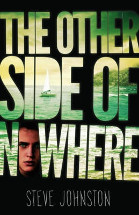The other side of nowhere by Steve Johnston

Hardie Grant Egmont, 2014. ISBN 9781742976907.
Looking forward to a sailing cruise to an island only three hours
off an unspecified part of the Australian coast, teenager Johnno and
his younger brother Matt journey by bicycle to the town of Shell
Harbour to meet up with old friend and yacht owner Nick. Unknown to
Nick, Johnno has organised for his cousin Georgina to join them on
the venture and the awkward revelation at her arrival causes some
embarrassment for all present.
A tension between Johnno and Nick is gradually revealed, based upon
the fact that whilst the pair had been inseparable companions as
youngsters, their friendship has changed since family circumstances
led to Nick moving from the city, to live with his father on a farm.
The sailing trip had been an eagerly anticipated opportunity get
together and enjoy adolescent male fun in the form of unsupervised
boating and camping. Nick recovers the situation by accepting and
making welcome Georgina and the group soon makes way. This follows
warnings from Nick's father to make sure he heads immediately to the
island to make safe anchorage prior to possible weather changes. The
members of the group are very young and only two have sailing
experience, causing the reader to query the wisdom of allowing the
significant venture.
An unexpectedly vicious storm seizes the vessel and the crew shows
courage and ingenuity to try and save the boat yet the situation
becomes so overwhelming that they are glad to escape with their
lives. Surviving the storm was harrowing but the group's ordeal
continues on the island when they realise that no rescue is
imminent, contrary to previous expectations, and their supplies of
food and water are extremely limited.
All are hungry and exhausted and Johnno's anxiety is increasing from
self analysis following his desperate actions during the storm.
Seeking shelter, the group encounters threatening criminals and must
apply themselves in extreme situations to try and evade them.
The angst of friendships which have been altered by time, changing
circumstances and then tested by trauma, as well as fraternal
rivalry and confused romantic yearning are important influences upon
how the group deals with challenges and threats.
Rob Welsh